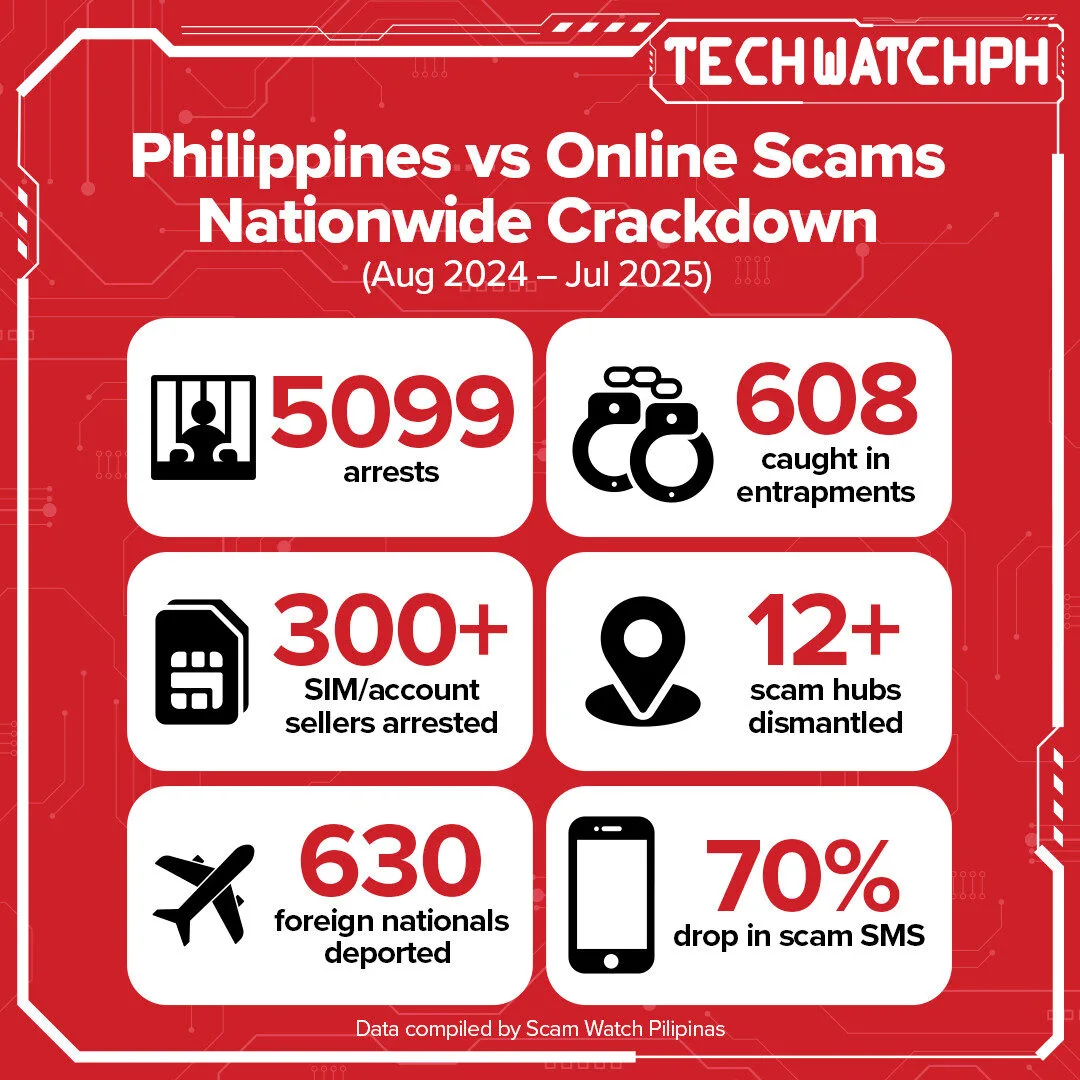About Us
Yes, scammers are getting caught — but no one’s talking about it
- CICC, Jocel De Guzman, PNP-ACG, Scam Watch Pilipinas, Scams
Techxistentialist
By Jocel De Guzman
Let’s be honest: for years, we’ve heard skeptical remarks like:
“Wala namang nahuhuli.”
“Wala rin mangyayari.”
“Sayang lang ang oras.”

That sense of futility kept many victims from reporting. It felt like scams had no consequence—and the scammers felt unstoppable.
Then something changed. Maybe you noticed it too—those annoying, scammy SMS texts you used to get, 10 or even 20 a day? They’re now down to one or two a week.
Could this be the result of joint efforts by law enforcement agencies to arrest scammers and dismantle scam hubs across the country? We attempted to find out.
We at Scam Watch Pilipinas decided to consolidate all publicly available scam-related data from the PNP Anti-Cybercrime Group (PNP-ACG), Gogolook, the Cybercrime Investigation and Coordinating Center (CICC), and news reports on law enforcement operations to deductively verify if they are indeed arresting scammers.
The challenge today is that no single agency maintains a unified, comprehensive database on scam-related incidents in the Philippines—making it difficult to see the bigger picture of our progress in the fight against online scams.
Between August 2024 and July 2025, our national agencies launched a bold, coordinated crackdown on scam syndicates—and the results are hard to ignore:
- 5,099 people arrested, linked to fraud, trafficking, and cyber scams
- 12-plus scam hubs dismantled, including massive operations posing as BPOs
- Over 300 individuals caught selling fake SIMs and mule accounts
- Around 630 foreign nationals deported for their role in organized fraud
- More than 14 IMSI catcher devices seized, linked to a Malaysian seller in Region 3
- Most visibly, a 70 percent nationwide drop in SMS scam traffic
These weren’t random wins. They were the result of relentless effort—despite the serious shortage of manpower and equipment.
Credit goes to the PNP‑ACG, National Bureau of Investigation (NBI), Presidential Anti‑Organized Crime Commission (PAOCC), Bureau of Immigration (BI), Department of Justice (DOJ), and the CICC. They worked under intense pressure, against escalating threats, and with limited tools—but they delivered outcomes that matter to every Filipino.
It’s unfortunate that such significant wins—with real arrests, real disruptions, and real impact—were left out of this year’s State of the Nation Address (SONA). This omission is a direct result of the lack of a consolidated national database on scam-related arrests and enforcement efforts. Without a unified view of these victories, even the President was unable to showcase the country’s progress against online scams. In an era where cyber fraud is the new street crime, those on the frontlines deserve both recognition and reinforcement from the highest office.
Scammers haven’t gone away. They’ve adapted.
Like crime since time immemorial, cybercrime evolves with the times—shifting from smishing to vishing, fake apps, synthetic identities, and even AI-generated deception. The battlefield may change, but the threat remains.
That’s why vigilance matters. Report scams and suspicious numbers to the 1326 National Anti-Scam Hotline. You can also use tools like the Whoscall app to help screen unknown calls and reduce your risk of falling for voice-based scams.
Cybercriminals may not rest— but neither should we.
(Jocel De Guzman is the Co-Founder of Scam Watch Pilipinas, Founder and President of Truth360 Inc., and ePublisher of TechWatchPH)
